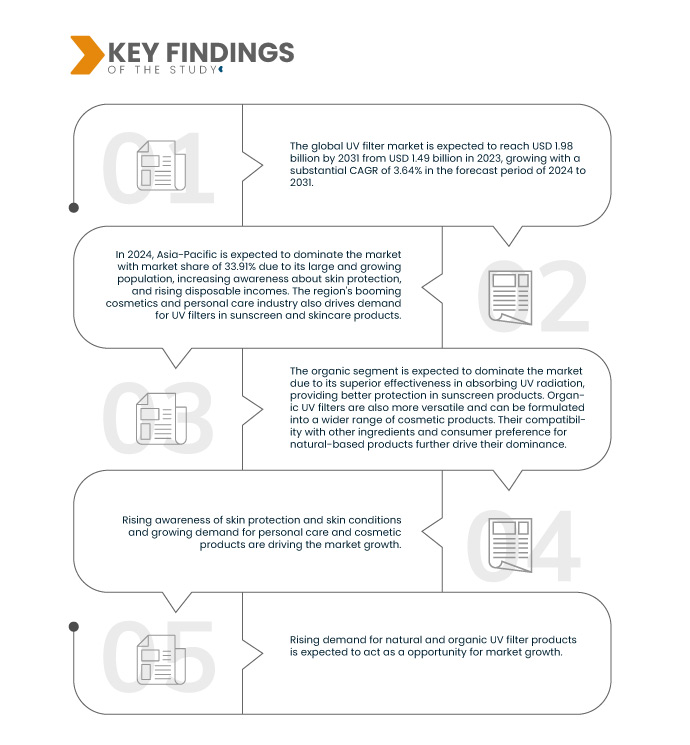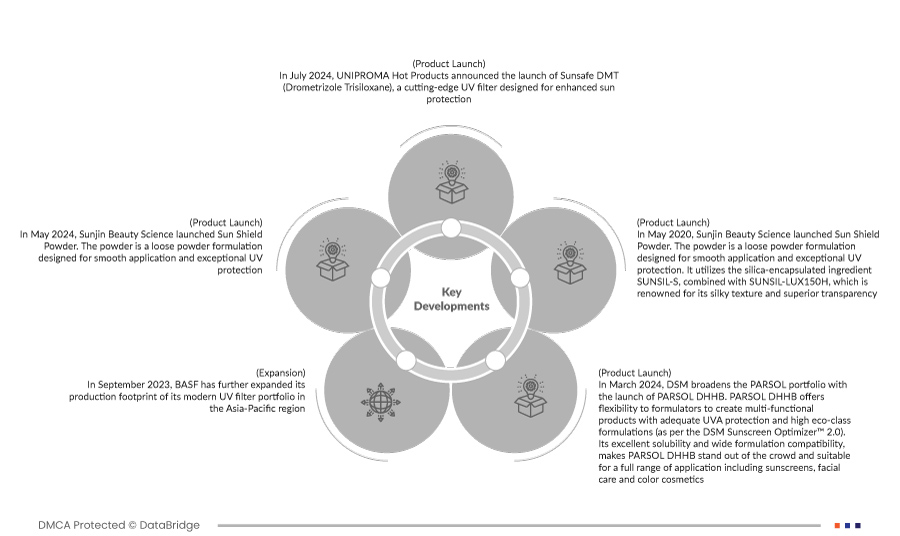UVフィルターは、紫外線(UV)を遮断または吸収する化合物です。日焼け止め、化粧品、様々なスキンケア製品によく含まれています。これらのフィルターは、日焼け、早期老化、皮膚がんの原因となる有害な紫外線から肌を守ります。UVフィルターは、主に化学吸収剤と物理遮断剤の2種類に分類されます。化学吸収剤は紫外線を吸収し、無害な熱に変換します。酸化亜鉛や二酸化チタンなどの物理遮断剤は、紫外線を反射・散乱させて肌から遠ざけます。これらの使用は、肌の健康を維持し、紫外線によるダメージを防ぐために不可欠です。
完全なレポートは https://www.databridgemarketresearch.com/reports/global-uv-filter-marketでご覧いただけます。
世界のUVフィルター市場規模は19億8000万米ドルと評価された。数百万2031年には14億9000万米ドルに達すると予測されている。数百万2023年までに、2024年から2031年の予測期間中に3.64%のCAGRで成長すると予想されます。
研究の主な結果
- パーソナルケア製品と化粧品の需要増加
肌の健康と有害な紫外線からの保護に対する意識の高まりにより、日焼け止めや日常的なスキンケア製品における効果的なUVフィルターの必要性が高まっています。消費者は、早期老化や皮膚がんなど、紫外線曝露による長期的な影響に対する意識が高まっており、UVフィルターを配合した製品の需要が高まっています。
化粧品業界は急速に進化しており、基本的なスキンケアを超えた付加価値を提供する製品の開発に注力しています。UVフィルターは、保湿剤、ファンデーション、リップクリームなど、幅広い製品に取り入れられ、包括的な日焼け対策を提供しています。この傾向は、紫外線量の多い地域で特に顕著で、消費者はUVカット機能を備えた製品を求める傾向があります。UVフィルター技術の進歩も、市場の成長に重要な役割を果たしています。メーカーは、より効率的で安定した、広範囲の紫外線から肌を守るUVフィルターの開発に研究開発投資を行っています。これらのイノベーションは、パーソナルケア製品や化粧品の有効性を高めるだけでなく、潜在的な副作用や環境への影響に関する消費者の懸念にも対処します。
パーソナルケア製品と化粧品の需要増加は、UVフィルター市場の主要な牽引役です。肌の健康に対する意識の高まり、UVフィルター技術の進歩、そして厳格な規制基準は、いずれも市場の拡大に貢献しています。消費者がスキンケアルーティンにおいて紫外線対策を重視する傾向が続く中、革新的で効果的なUVフィルターへの需要は引き続き堅調に推移し、市場のさらなる成長を牽引するでしょう。
レポートの範囲と市場セグメンテーション
レポートメトリック
|
詳細
|
予測期間
|
2024年から2031年
|
基準年
|
2023
|
歴史的な年
|
2022年(2016年~2021年にカスタマイズ可能)
|
定量単位
|
収益(10億米ドル)
|
対象セグメント
|
製品(有機、無機、ハイブリッド)、用途(パーソナルケアおよび化粧品、プラスチック、包装、工業用コーティング、建設、光学レンズ、繊維、農業、家庭用電化製品、その他)
|
対象国
|
米国、カナダ、メキシコ、ドイツ、フランス、英国、イタリア、ロシア、スペイン、オランダ、ベルギー、スウェーデン、スイス、ポーランド、ノルウェー、デンマーク、トルコ、フィンランド、その他のヨーロッパ諸国、中国、日本、韓国、インド、オーストラリア、インドネシア、タイ、マレーシア、ベトナム、フィリピン、シンガポール、ニュージーランド、台湾、その他のアジア太平洋諸国、ブラジル、アルゼンチン、その他の南米諸国、UAE、サウジアラビア、南アフリカ、エジプト、クウェート、カタール、オマーン、バーレーン、その他の中東およびアフリカ諸国
|
対象となる市場プレーヤー
|
BASF SE(ドイツ)、DSM(オランダ)、Ashland(米国)、MFCI CO.,LTD(中国)、Sunjin Beauty Science(韓国)、EverCare(米国)、Sarex(インド)、UNIPROMA HOT PRODUCTS(英国)、Omega Optical, LLC.(米国)、IRA Istituto Ricerche Applicate(イタリア)
|
レポートで取り上げられているデータポイント
|
データブリッジマーケットリサーチがまとめた市場レポートには、市場価値、成長率、セグメンテーション、地理的範囲、主要企業などの市場シナリオに関する洞察に加えて、専門家による詳細な分析、地理的に表された企業別の生産量と生産能力、販売業者とパートナーのネットワークレイアウト、詳細かつ最新の価格動向分析、サプライチェーンと需要の不足分析も含まれています。
|
セグメント分析
世界の UV フィルター市場は、製品と用途に基づいて 2 つの主要なセグメントに分割されています。
- 製品に基づいて、市場は有機、無機、ハイブリッドに分類されます。
2024年には、オーガニックセグメントが世界のUVフィルター市場を支配すると予想されています。
2024年には、優れた紫外線吸収効果により日焼け止め製品における日焼け防止効果を高め、オーガニックセグメントが58.60%の市場シェアを獲得し、市場を席巻すると予想されています。オーガニックUVフィルターは汎用性が高く、幅広い化粧品に配合可能です。他の成分との相性の良さや、消費者の自然由来製品への嗜好も、オーガニックセグメントの優位性をさらに後押ししています。
- アプリケーションに基づいて、市場はパーソナルケアと化粧品、プラスチック、包装、工業用コーティング、建設、光学レンズ、繊維、農業、家庭用電化製品、その他に分類されます。
2024年には、パーソナルケアと化粧品セグメントが世界のUVフィルター市場を支配すると予想されています。
2024年には、有害な紫外線からの肌保護に対する消費者意識の高まりにより、パーソナルケア・化粧品セグメントが市場シェアの59.51%を占め、市場を牽引すると予想されています。日焼け止め、アンチエイジング製品、UVカット成分を含むデイリースキンケア製品の使用増加が、この需要を牽引しています。
主要プレーヤー
Data Bridge Market Research は、世界の UV フィルター市場の主要企業として、BASF SE (ドイツ)、DSM (オランダ)、Ashland (米国)、MFCI CO.,LTD (中国)、Sunjin Beauty Science (韓国) を分析しています。
市場動向
- 2024年7月、UNIPROMA Hot Productsは、日焼け止め効果を高めるために設計された最先端のUVフィルター、Sunsafe DMT(ドロメトリゾールトリシロキサン)の発売を発表しました。急速に進化するスキンケア分野において、ドロメトリゾールトリシロキサンは有害な紫外線から肌を守る優れた効果で高く評価されています。消費者が肌の健康を重視する傾向が高まる中、Sunsafe DMTは現代の日焼け止め処方において重要な成分として注目されています。この革新的な製品は、日焼け止めにおける最先端のソリューションを提供するというUnipromaのコミットメントを体現しています。
- 2024年5月、サンジンビューティーサイエンスはサンシールドパウダーを発売しました。このパウダーは、なめらかな塗布感と優れたUVカット効果を実現するルースパウダーです。シリカカプセル化成分「SUNSIL-S」と、シルキーな質感と優れた透明感で知られる「SUNSIL-LUX150H」を配合しています。
- 2023年9月、BASFはアジア太平洋地域における最新UVフィルターポートフォリオの生産拠点をさらに拡大しました。Uvinul A Plusは、現在市場で入手可能な数少ない光安定性UVAフィルターの一つであり、太陽の有害なUVA波を確実に遮断し、フリーラジカルや肌へのダメージから肌を守ります。
- 2024年3月、DSMはPARSOL DHHBの発売によりPARSOLポートフォリオを拡大します。PARSOL DHHBは、十分なUVAカット効果と高い環境適合性(DSMサンスクリーンオプティマイザー™ 2.0に準拠)を備えた多機能製品の開発を、処方設計者に柔軟に提供します。優れた溶解性と幅広い処方適合性により、PARSOL DHHBは他社製品とは一線を画し、日焼け止め、フェイシャルケア、カラーコスメなど、幅広い用途に適しています。
- 2020年5月、サンジンビューティーサイエンスはサンシールドパウダーを発売しました。このパウダーは、なめらかな塗布感と優れたUVカット効果を実現するルースパウダーです。シリカカプセル化成分「SUNSIL-S」と、シルキーな質感と優れた透明感で知られる「SUNSIL-LUX150H」を配合しています。
地域分析
地理的に見ると、世界のUVフィルター市場レポートでカバーされている国は、米国、カナダ、メキシコ、ドイツ、フランス、英国、イタリア、ロシア、スペイン、オランダ、ベルギー、スウェーデン、スイス、ポーランド、ノルウェー、デンマーク、トルコ、フィンランド、その他のヨーロッパ諸国、中国、日本、韓国、インド、オーストラリア、インドネシア、タイ、マレーシア、ベトナム、フィリピン、シンガポール、ニュージーランド、台湾、その他のアジア太平洋諸国、ブラジル、アルゼンチン、その他の南米諸国、UAE、サウジアラビア、南アフリカ、エジプト、クウェート、カタール、オマーン、バーレーン、その他の中東およびアフリカ諸国です。
Data Bridge Market Researchの分析によると:
アジア太平洋地域は世界のUVフィルター市場において支配的かつ最も急速に成長している地域である。
アジア太平洋地域は、人口が多く増加していること、皮膚保護に対する意識が高まっていること、可処分所得の増加により日焼け止めやスキンケア製品におけるUVフィルターの需要が高まっていることから、市場を独占すると予想されています。
世界のUVフィルター市場レポートの詳細については、ここをクリックしてください – https://www.databridgemarketresearch.com/reports/global-uv-filter-market













